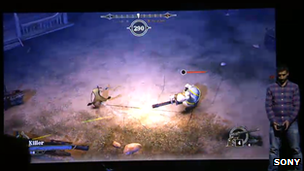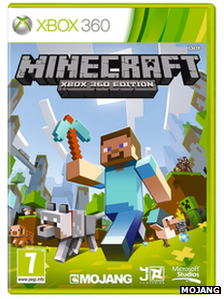Microsoft's Xbox One team courts indie developers
- Published

Microsoft's Xbox One console is due to go on sale later this year
Microsoft is offering free Xbox One development kits to approved video games makers to encourage small teams to make titles for its forthcoming console.
It announced the move at the Gamescom trade fair in Cologne as part of its ID@Xbox self-publishing programme.
The equivalent hardware for the Xbox 360 costs thousands of pounds.
One expert said the move might help address a perception that Sony was more "indie-friendly".
The PlayStation maker dedicated a large part of its presentation to independent developers at the E3 expo in June, while Microsoft only briefly mentioned the sector at the Los Angeles event.
"Microsoft needed to be stronger about its message about this side of the industry," said Ed Barton, director of digital media at research firm Strategy Analytics.
"It has always been good at supporting the big firms with 400-strong teams, but it needs to show it can go down the spectrum all the way to the one-man bands.
"No-one knows where the next Minecraft will come from. And even if this doesn't move the needle hugely in terms of video game sales it will get the firm good press. There's a part of the public that love [independent] games like Journey - they make the ecosystem more interesting."
Track record
Although Microsoft said that in time it intended to make it possible for software writers to create games using retail versions of the Xbox One, at launch the facility will be limited to special development editions of the machine.

Sony spent time spotlighting eight titles from small independent developers at E3
To qualify, it said, developers must have a proven track record of shipping games on a console, PC or mobile devices.
Teams which are approved will be given two of the development machines free of charge.
The teams must also have their programs certified by Microsoft's managers before they become available to the public, but they will be free to set their own wholesale price to which the console-maker will then add its own charge.
Microsoft added that it was taking steps to make sure gamers could easily discover self-published titles on its marketplace by:
Allowing the games to show up in the main Xbox One store rather putting them into a separate area, as was the case with the Xbox 360
Offering a view of what is "trending", based on what the gamers' friends and the wider community are playing
Using an "editor picks" section to showcase indie titles
In addition, it confirmed it would not charge developers to distribute software updates - the firm ended such fees for the Xbox 360 in April - and would not place a limit on how many updates they offered.
Microsoft added that it would now host events in London, Seattle and San Francisco for applicants to find out more.
"We are committed to ID@Xbox and are fully invested in helping independent developers succeed on Xbox One," said Marc Whitten, Xbox chief product officer.
'Right direction'
Barry Meade of Fireproof Studios - a 14-person team that won Bafta's award for best British game earlier this year - had previously criticised Microsoft for "interminable bureaucracy, exorbitant fees and, let's be honest, frequent head-in-the-sand arrogance".

Minecraft has been one of the biggest "indie" hits for the Xbox 360
However, he gave a cautious welcome to the latest announcement.
"This is an encouraging step for indie developers and it looks like Microsoft is going in the right direction," he told the BBC.
"We'll have to wait for more information on the actual cost of set-up and games submission - historically high for small teams.
"And it remains to be seen what the firm's actual attitude is to indie development as, again, historically this has not been Microsoft's greatest strength. But this is good news so far."
Prof Louis Natanson, who leads computer games education at Abertay University in Dundee, also welcomed the news.
"The next generation of consoles is now looking very exciting for indie companies, with Microsoft's announcements today and Sony's work on bringing indie games to the Vita and building the PlayStation 4 to make it easily accessible to small development teams," he said.
"There hasn't been a more exciting time for indie developers since the bedroom development scene of the 1980s and 1990s."
- Published11 June 2013
- Published10 June 2013
- Published25 July 2013